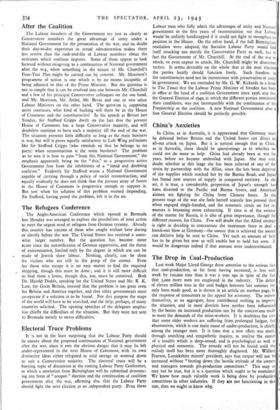Electoral Truce Problems
It is not in the least surprising that the Labour Party should be uneasy about the proposed continuation of National government after the war, since it sees the obvious danger that it may be left under-represented in the next House of Commons, with its own ,distinctive ideas either relegated to cold storage or watered down to suit a Conservative majority. The electoral truce will be a burning topic of discussion at the coming Labour Party Conference, to which a resolution from Birmingham will be submitted denounc- ing any form of " coupon " election and the continuation of coalition government after the war, affirming also that the Labour Party should fight the next election as an independent party. Even those Labour men who fully admit the advantages of unity and National government in the first years of reconstruction see that Labour would be unfairly handicapped if it could not fight to strengthen its position in the House. On the other hand, if the full Birmingham resolution were adopted, the Socialist Labour Party would find itself attacking not merely the Conservative Party as such, but in fact the Government of Mr. Churchill. At the end of the war to attack, or even appear to attack, Mr. Churchill might be disastrous tactics. It seems desirable on the whole that at the next election the parties locally should function freely. Such freedom in the constituencies need not be inconsistent with preservation of unity in government. We are reminded by Mr. G. W. Rickards in a letter to The Times that the Labour Prime Minister of Sweden has been in office at the head of a coalition Government since 1936, and that the General Election of 1940, in which the different parties nominated their candidates, was not incompatible with the continuance of his Premiership or the coalition. A new National Government after a free General Election should be perfectly possible.


























 Previous page
Previous page